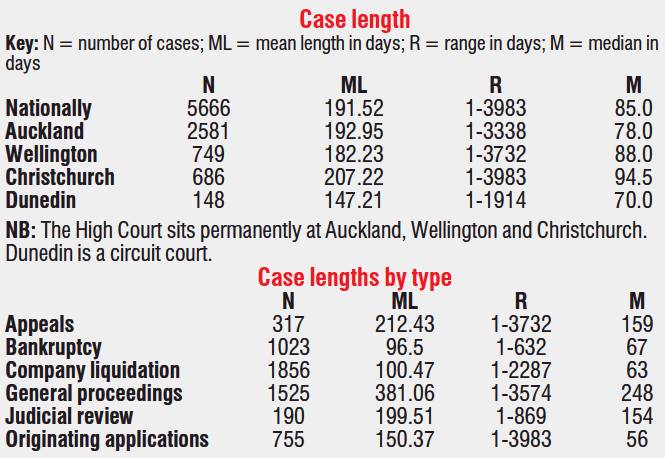An antiquated, paper-driven system is a major reason behind delays in High Court civil cases, new University of Otago research has found.
On average, a High Court civil case - a proceeding such as bankruptcy, judicial review or a company liquidation - takes 191 days, researchers found.
However, some cases have drifted.
One Christchurch case was before the courts for 3983 days - more than 10 years.
The reasons for delay were manifold and delays could actually be a good thing if parties reached a mutually satisfactory settlement in the interim, Dr Bridgette Toy-Cronin, lead author of the research, said.
However, all cases, whether short or long, had to go through a court system still largely based on paper files.
''The technology behind the court system is getting very antiquated and there has been underinvestment in it ... the court is still very driven by paper,'' the University of Otago Legal Issues Centre director said.
''I know the Ministry of Justice is starting to look at how to deal with this, but it needs serious investment ... at the moment court staff are using a lot of time-consuming manual processes.''
The courts have been slow to adopt electronic technology, and problems with previous IT projects such as the District Court's criminal case management system ''E-Bench'' had led to anxiety about cost and effectiveness of computerising court systems, Dr Toy-Cronin said.
However, modernising systems was a necessity which could no longer wait.
''I think the time has well and truly come when we do have to do that,'' Dr Toy-Cronin said.
''It is the future and you can't keep running a paper-based court system: it's just not credible ... you can't get big changes or pick-ups in pace if you are still printing out emails and putting them in a paper file.
''There is a limit to which you can make that efficient.''
Wheels Of Justice: Understanding the Pace of Civil High Court Cases - conducted by the Legal Issues Centre and co-funded by the Law Foundation - studied civil cases disposed of by the High Court from July 1, 2014 to June 30, 2015.
Of those 5666 cases nationwide, the average length a case took was 191 days.

However, not all parties might think that was a long time, researchers found.
Experienced litigants and corporate organisations generally expected court cases would take time and anticipated delays.
Parties less familiar with the law might find that an extremely long time, and there was a concern mounting expenses might lead to many cases being settled for economic reasons rather proceeding to court.
That raised real issues about equal access to justice, Dr Toy-Cronin said.
''They are told by lawyers that it is slow and expensive.
''If they don't have a good case that is a good thing, but if they do have a good case it is a bad thing because it means that cases which should be being heard by the courts are not being heard by the courts ... I have reason to suspect that often they are settling because it has become too expensive and slow for them: life has moved on and they cannot afford to sustain the case any more.
''That can actually make the statistics look better because it makes the case length look shorter, so it can look positive and in some cases it might be, but in others they may be withdrawing because it is too slow or expensive, and that is not a good thing.''
Availability of the central players in cases, such as expert witnesses, in-demand lawyers and even judges could also lead to delays, researchers found.
However, initiatives such as setting early trial days to encourage certainty for all parties had helped.
So had establishing special courts to deal with cases such as weathertightness issues and disputes arising from the Canterbury earthquakes - quake litigation makes up 11% of all civil cases before the New Zealand courts.
''The High Court judiciary have been very proactive about experimenting with how to make things go faster and the earthquake court lists are a good example of that: they've really tried to innovate to manage those delays,'' Dr Toy-Cronin said.
''But they've only got control over a part of the situation: you've got to have counsel and litigants play the game as well.''
Chief Justice Dame Sian Elias has recently warned a trend to settle criminal cases as fast as possible ran the risk of defendants being denied justice.
Similar issues existed if civil cases were accelerated to get them out of the system without consideration being given to their merits, Dr Toy-Cronin said.
''There is a lot of pressure to get the trends downwards, and you get settlements like you get plea bargains ... we need to be very careful about what that means for justice and for the rule of law.''
- By Mike Houlahan


